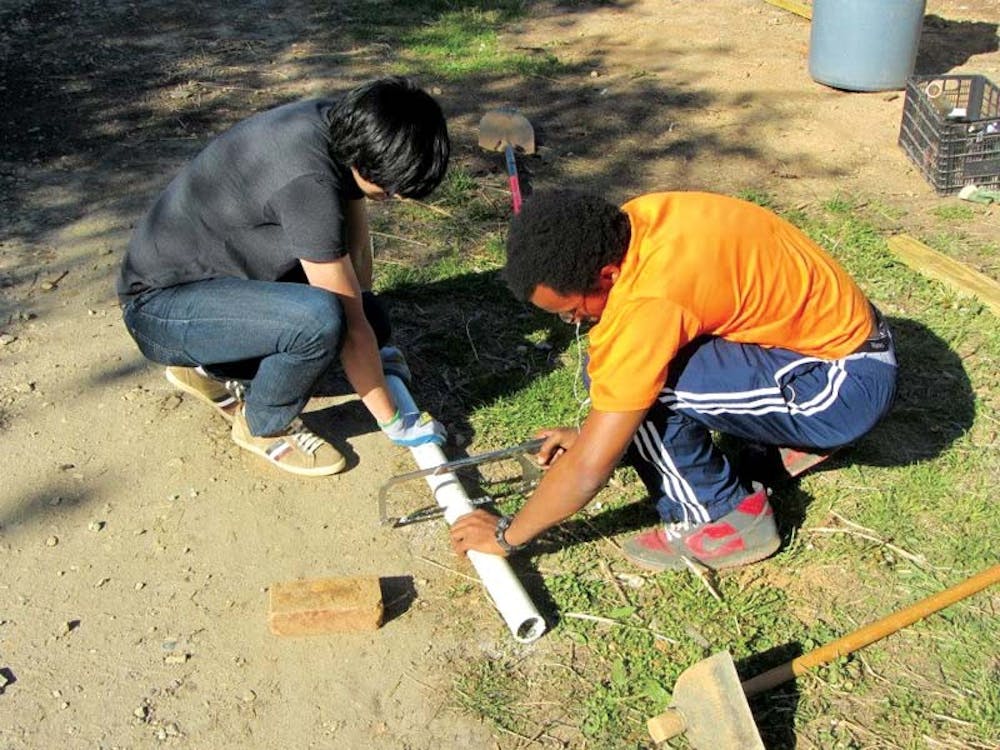
Engineers from Penn worked with students at the Saul Agricultural high school to create an irrigation system that minimizes mosquitos and helps to water the crops.
Credit: Courtesy of Saahil SanonIn May, a group of high school students from Philadelphia, along with the help of some Penn engineers, installed a water tank that would help them transport barrels of rainwater to the field of crops on their school farm.
This project at the Saul High School of Agricultural Sciences is the result of years of work between the school and Penn students from Engineers Without Borders. It first came about because of a mosquito infestation that came from stagnant water that had collected in rain barrels and the school’s crop washing station. The solution was to lay out pipes that connect rain barrels and crop washing stations to a covered water tank, which would allow students to later reuse the water for crops.
EWB is a national nonprofit humanitarian organization aimed at promoting sustainability and implementing development projects in local and global communities.
Globally, the organization travels to places such as Guatemala and Cameroon. Locally, the group travels every Wednesday afternoon to Saul High School and Girard College, a magnet school and boarding school, respectively, in North Philadelphia.
“The goal is to improve communities around the world through engineering sustainability projects. We wanted to bring the same idea and apply it to the local community,” Engineering senior and EWB Vice President of Local Projects Saahil Sanon said.
During their weekly visits, volunteers plan out activities for high school students to bring the material they learn in textbooks to life. One such activity is an egg drop project, where students use basic materials like cotton and straws to build a structure that would prevent an egg from cracking when it falls.
This activity teaches the students the “basics of engineering,” Engineering senior and EWB Co-President Shivali Khetan said.
Related: Penn Engineering honors prof Barbara Liskov
They also use the projects as a way to teach students about green technology. This includes the slow sand filter project, which demonstrates how water is filtered. Using a one-liter bottle, sand, gravel, cotton and a few other objects, students are able to follow the process of water as it is cleaned by the makeshift filter.
Khetan explained that this activity is meant to show students that there many ways to filter water that are economically feasible. “Sustainability and clean water are not out of reach. It just needs to be taught and implemented,” she said.
Other projects include oil clean-up and creating a miniature solar car.
EWB has been working with Saul for six years and Girard for two years. The educational activities are meant to be hands-on to allow full engagement and understanding of how engineering and science can be applied to the real world, Sanon said.
Related: Sustainability group kicks off Green Week
Larger projects have not yet taken place at Girard, since the partnership is still relatively new. Future projects include a similar irrigation system as well as a possible green roof.
Students at Saul and Girard are excited to be involved, Engineering sophomore and the Saul partnership chair James Lovey said, “We introduce them to higher level and more theory-based science that they wouldn’t get otherwise.”
Khetan emphasized that EWB is an opportunity for everyone, not just engineers. “All of our projects are 10 percent engineering and 90 percent knowing how to work with people and the community.”
The Daily Pennsylvanian is an independent, student-run newspaper. Please consider making a donation to support the coverage that shapes the University. Your generosity ensures a future of strong journalism at Penn.
DonatePlease note All comments are eligible for publication in The Daily Pennsylvanian.








